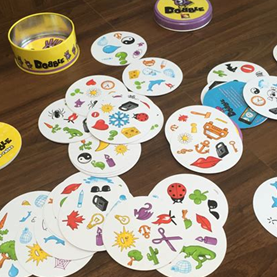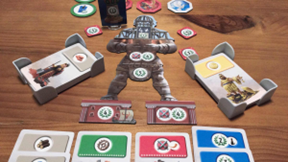- Christmas is coming, the goose is getting fat
- Please [do] put a penny in the old man's hat
- If you haven't got a penny, [then] a ha'penny will do
- If you haven't got a ha'penny, [then] God bless you!
It’s that time of the year again and I am sure that some of you are already scrambling to buy some presents for your kids and loved ones. As I did the previous year, I would like to put together a list of board games you might want to consider as gift ideas. This year I decided to focus on three categories, the first is the pre-teen 7 to 11 bracket since I happen to have one such kid myself. The second category is “family games” since these are among the first a child experiences growing up. The final recommendations are linked to cooperative games, a gaming genre I particularly enjoy.
In my opinion board games can be a
great way to have fun, learn new skills, and bond with family and friends. Kids
aged 7 to 11 are ready for more challenging and diverse games that can
stimulate their creativity, logic, memory, and social interaction. Here are my
selections for possible options you might be willing to try out.
Ticket to Ride: First Journey:
This is a beginner-friendly version of the popular train game Ticket to Ride,
where players collect cards and claim routes across a map. Kids will learn
about geography, planning, and cooperation while enjoying the colourful and
detailed artwork. Ticket to Ride: First Journey is suitable for 2 to 4 players,
and each game lasts about 15 to 30 minutes. However, as I often recommend, do
set aside an additional 15 to 20 minutes if you will be playing this game for
the first time.
Boggle: This can now be
considered a classic word game where players shake a grid of letter dice and
try to find as many words as possible in a limited time. Kids will improve
their spelling, vocabulary, and speed while competing with others. Boggle is
suitable for 1 or more players, and each game lasts about 3 minutes. This game
offers some sensible flexibility due to the short duration and players can
agree to play the best of 5 or 10 games depending on the willingness of the players.
Dobble: This is a fast-paced
observation and reflex game. Kids match symbols between cards, enhancing visual
perception and attention skills. Its simple rules make it suitable for various
age groups but works well with pre-teen players. Again, due to its simple structure
and short duration, Dobble could be used as a filler game before or after that
a larger board game is brought to the table.
Kingdomino: This is a
tile-laying game where players build their kingdoms. It's easy to learn, yet
strategic, fostering critical thinking and planning skills. Turns are quick and
tiles for each player’s tableau of 5X5 squares are drafted following a simple
drawing mechanism. It’s fun while being sufficiently linear to draw in young
players with ease.
Scrabble Junior: This is a more
colourful version of the classic word-building game. As with regular Scrabble,
players are invited to make out the best words with whatever tiles they draw. A
great way to strengthen spelling, and word recall as well as teach some basic
strategic skills. This version could also become a springboard to the full
game, often overlooked as a gift idea but with a keen following the world over.
Okay, now let’s look at
some great games that work well in a family setting. Normally here we are
thinking of games that play well in a mixed-age group, and which don’t put
younger kids at a disadvantage. You basically want games that don’t put adults
in an awkward situation whereby they would need to impose handicaps or play
loosely to aid the younger players.
You can never go wrong with Carcassonne.
Carcassonne is a tile-laying game where players strategically place tiles to
create a medieval landscape, earning points for roads, cities, monasteries, and
farms. This game teaches strategy, spatial reasoning, and resource management.
Its simple turn-taking mechanism and brief ruleset make it an ideal easy-to-teach game for
young ones within a family setting.
Codenames is a word
association game where two teams compete to identify their secret agents by
using one-word clues. This game promotes creativity, teamwork, and lateral
thinking. At its core, Codenames is a race to decipher the secret identities of
undercover agents before the opposing team can.
If code-breaking is not your
thing, why not take your family to Tokaido. Tokaido offers a peaceful
and scenic journey game where players travel along the East Sea Road,
collecting souvenirs, encountering travellers, and enjoying the beauty of
Japan. This game emphasises relaxation, planning, and resource management. In
Tokaido, players take turns moving their meeples along the route, drawing
destination cards, collecting resources, and performing various actions at
designated intersections. Each player's turn ends when they have either
completed their movement or decided to pass. The next player then has their
turn, and the process continues until the game ends after a predetermined
number of turns or when a player reaches the destination.
Sushi Go! Party! Is an
expanded and more chaotic version of Sushi Go!, with more cards, special
abilities, and scoring options. In Sushi Go! Party!, players take turns
simultaneously revealing their hand of sushi cards and deciding whether to keep
the card for their own score or pass it to the left or right. Once all players
have passed their cards, the next round begins with new cards. This process
continues until all cards have been played. This game provides more strategic
depth and replay value for families.
7 Wonders: Architects is a
fast-paced, family-friendly game of card drafting and resource management for
2-7 players. It is a simplified and streamlined version of the original 7
Wonders, making it a great choice for new players or those who want a quicker
game experience.
In 7 Wonders: Architects, players
take turns drafting cards from a pool of face-up cards, and then using those cards
to construct their wonders and score points. Cards can be used to build
structures, gather resources, or develop scientific advancements. Players also
can trade resources with each other or with the bank.
At the end of the game, players
score points for their constructed wonders, scientific advancements, and
unspent resources. The player with the most points at the end of the game wins.
Cooperative Games
In this last section, I intend to
focus on cooperative board games. In the realm of board games, cooperative
games stand as a testament to the power of teamwork and collaboration. Unlike
competitive games where players strive for individual triumph, cooperative
games emphasize united effort towards a common goal, fostering a sense of
camaraderie and shared accomplishment.
Cooperative games serve as
exceptional icebreakers for groups of individuals, particularly those with
limited interactions or unfamiliarity. By immersing players in a shared
objective, these games encourage open communication, strategic thinking, and a
willingness to embrace the unique strengths of each team member.
Forbidden Desert: Players here embark on an exhilarating adventure in a vast desert landscape where teamwork is the key to survival. In this cooperative game, players unite to unravel the secrets of a buried flying machine, its fragments scattered across the unforgiving dunes. As time relentlessly ticks away, players must collaborate strategically, manage their resources wisely, and overcome treacherous obstacles to piece together the legendary aircraft before the desert reclaims it forever. This engaging game offers an easy-to-learn yet deeply challenging and strategic experience, making it an ideal choice for families and groups of friends seeking a shared adventure.
The Crew: The Quest for
Planet Nine: A cooperative trick-taking game set in space. Players work
together to complete missions and discover the mysterious Planet Nine. It's
innovative and fosters communication. One of the key strengths of The Crew lies
in its ability to seamlessly blend the familiar elements of trick-taking with
cooperative gameplay. Players must work together to achieve common goals,
relying on each other's strengths and overcoming communication barriers.
Another standout feature of The Crew is its innovative use of hand signals and
player roles. These elements introduce a unique layer of communication and
deduction, adding to the strategic depth of the game.
Flash Point: Fire Rescue:
In this game, players work as a firefighting team to rescue people and pets
from a burning building. It emphasises teamwork, decision-making, and spatial
awareness. The game's immersive theme, strategic gameplay, and tense atmosphere
make it an exhilarating experience for both casual and experienced gamers. The
game's mechanics and components effectively capture the essence of
firefighting, from the unpredictable behaviour of the fire to the tension of
rescuing trapped civilians. Players feel the pressure of time and the weight of
their decisions, adding a layer of realism and excitement to the gameplay.
Gloomhaven: Jaws of the
Lion: A cooperative campaign-style game set in a fantasy world. It's more
complex but provides an immersive experience for families looking for a longer
gaming adventure. Gloomhaven: Jaws of the Lion is a standalone expansion for
the popular dungeon-crawling game Gloomhaven. It is a great introduction to the
world of Gloomhaven, with a streamlined ruleset and a shorter campaign. The
game is also smaller and more portable than the original Gloomhaven, making it
easier to take with you on the go.
5-Minute Dungeon: This is
a cooperative game where players work together as a team of heroes to defeat a
series of dungeons in 5 minutes or less. Players will use cards, symbols, and
quick thinking to overcome obstacles and enemies. 5-Minute Dungeon is suitable
for 2 to 5 players, and each game lasts about 5 minutes. The game is easy to
learn and teach, and it's perfect for a quick game night or family game night.
That concludes my recommendations for board games in all three categories. Some of these suggestions can be found at local stores, though you may need to call ahead to ensure availability. Others are available through online retailers like Amazon or AliExpress.
Before signing off this pre-Christmas blog, I'd also like to extend my warmest wishes for a joyous and peaceful Christmas with your loved ones. May you all find the time to meet up, play a few board games and share a few laughs, because, at the end of the day, life is all about the memories and experiences we share together.




















No comments:
Post a Comment